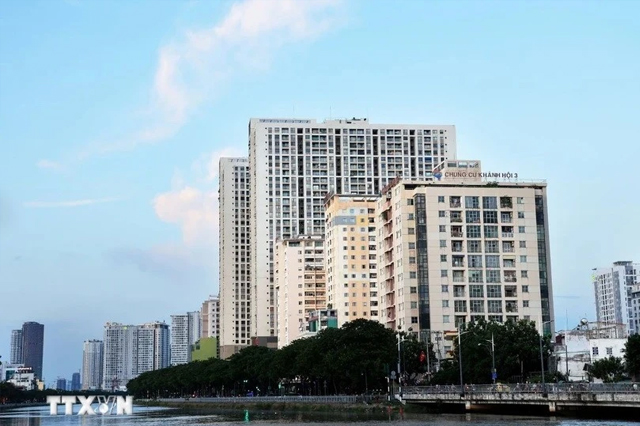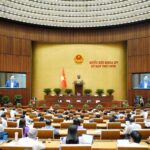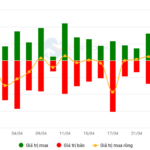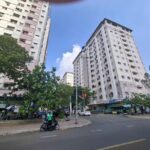
An affordable housing complex for low-income earners along the Tau Hu-Ben Nghe canal in District 4, Ho Chi Minh City. (Photo: Hong Dat/VNA)
|
The draft resolution on piloting several mechanisms and special policies for social housing development is among the key topics at the 9th session of the 15th National Assembly, expected to be passed through an expedited procedure to speed up its implementation. This proposal has attracted significant public attention and is hoped to alleviate bottlenecks in the development of affordable housing for low-income earners and workers.
Economic expert Dinh The Hien noted that the draft resolution introduces novel approaches to address previous challenges. Notably, it allows enterprises and organizations to rent social housing from project investors to accommodate their experts, officials, and employees. These rental expenses can be included in production and business costs, regular expenditure, or other legal expenses as stipulated by regulations.
This measure ensures fairness and encourages enterprises and organizations to take care of their experts’, officials’, and employees’ accommodation needs, fostering their long-term commitment and attachment.
Significantly, granting authority and responsibility to investors to establish pricing methods, approve selling and rental purchase prices based on legal regulations, and determine profit margins is a crucial step towards ensuring business autonomy, as stipulated in the Law on Enterprises.
One of the highly anticipated aspects by businesses is the proposed 70% reduction in processing time for social housing projects. This acceleration in project implementation is eagerly awaited by both investors and the general public, especially considering the current slow supply of social housing, which fails to meet practical demands.
For social housing projects not utilizing public investment capital, the government proposes that the provincial People’s Committees approve the investment policy and directly appoint investors without conducting a bidding process. This streamlined procedure could save approximately 200 days compared to current regulations.
To be considered for project allocation, investors must meet specific criteria, including being an enterprise or cooperative with a real estate business function, maintaining a healthy debt-to-equity ratio, and possessing a minimum of 20% equity capital for projects under 20 hectares and 15% for projects over 20 hectares.
In cases where enterprises simultaneously undertake multiple projects, they must also ensure sufficient equity capital allocation according to the required ratios. If multiple eligible investors apply, the selection will be based on project implementation experience, financial capacity, and submission timing.
Deputy Minister of Construction Nguyen Van Sinh highlighted the advantages of applying special mechanisms, stating that the current bidding process is economically and socially inefficient and prolongs project implementation. The proposed changes would reduce the time from investment policy approval to investor selection to a maximum of 75 days, a 70% reduction, according to Deputy Minister Sinh.
Given the strict controls on profit margins, pricing, and eligible buyers, bypassing the bidding process remains reasonable, transparent, and effective. Additionally, reducing red tape aligns with the government’s direction and objectives.
From a legal perspective, Lawyer Bui Quang Nghiem, Vice Chairman of the Ho Chi Minh City Bar Association and Director of Nghiêm và Chính Law Firm, suggested considering a new clause. This clause would stipulate that investors in social housing projects are legally responsible for identifying eligible buyers or rental purchasers as per the Law on Housing. They would also be required to submit a list of buyers or rental purchasers to the housing management agency for oversight and “post-inspection.”
In reality, the process of approving the list of eligible beneficiaries takes a significant amount of time. Therefore, clearly defining the responsibilities of social housing project investors is crucial to prevent profiteering and reselling of subsidized housing units for profit.
Article 88 of the 2023 Law on Housing also stipulates stringent consequences for violations regarding eligible buyers or conditions for purchasing or renting social housing. In such cases, the contract is deemed invalid, and if the housing unit is not returned, the local People’s Committee will organize a forced retrieval. Hence, emphasizing the investor’s responsibility in this matter enhances their accountability and proactive approach, reducing red tape, compliance costs, and societal burden.
The special mechanisms for social housing also encompass crucial policies, such as allowing investors to earn a maximum profit margin of 13% of the total investment cost and proposing the establishment of a “National Social Housing Development Fund.” Additionally, the government recommends exempting social housing projects from the investment approval procedure and enabling enterprises and cooperatives in industrial parks to rent social housing for their employees.
The resolution on piloting mechanisms and policies for social housing development is expected to pave the way for an increased supply of social housing, meeting the needs of eligible individuals.
Thu Hang
– 20:23 05/07/2025
A Proposal to Adjust Excise Tax Rates for Select Products and Commodities
The proposed revisions to the Special Consumption Tax Law offer a nuanced approach to taxation. Alongside exempting smaller air conditioners from special consumption tax, the draft law addresses nuanced scenarios, such as exported goods that have already incurred special consumption tax being returned from abroad. Additionally, it proposes adjustments to tax rates for pick-up trucks and a revised plan for implementing tax rates on alcoholic beverages from 2027 onwards.
Affordable Housing Dominates with Over 3,300 Units Approved for Sale in April 2025.
According to data from local construction departments, there were 23 eligible projects with a total of 7,567 units of off-plan properties across 15 provinces and cities in April 2025. Social housing accounted for a significant portion of these, with 3,331 units.





















